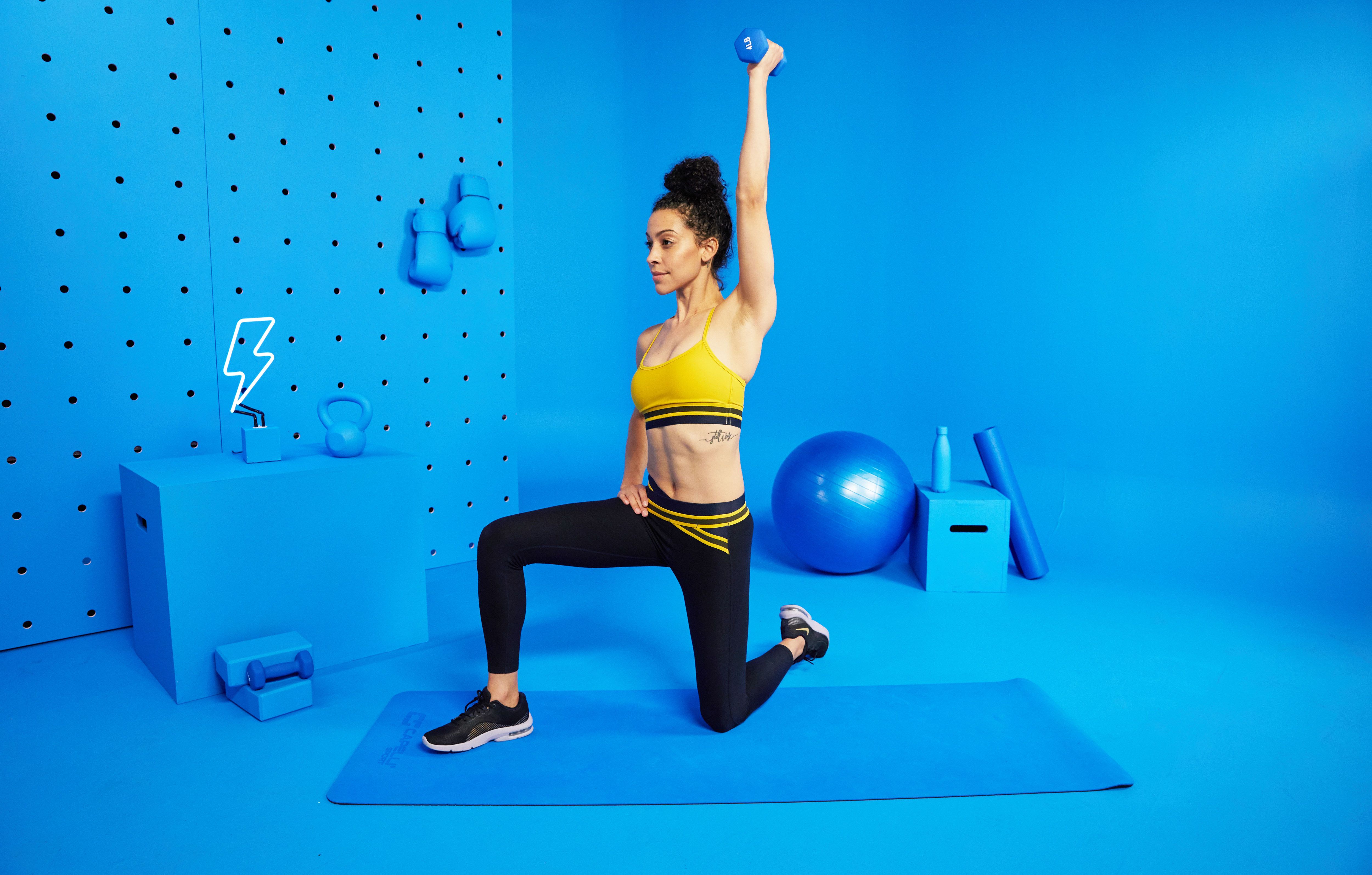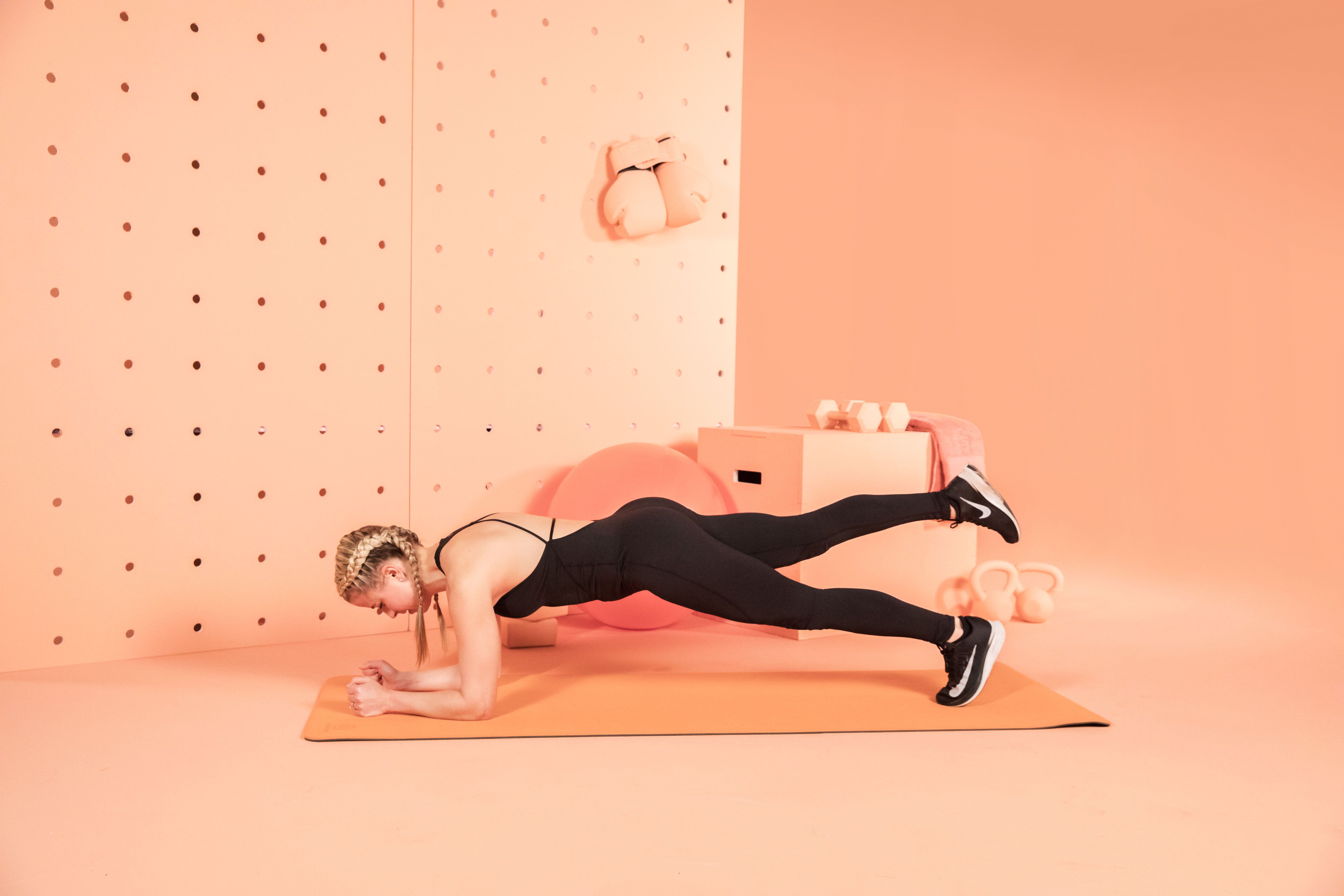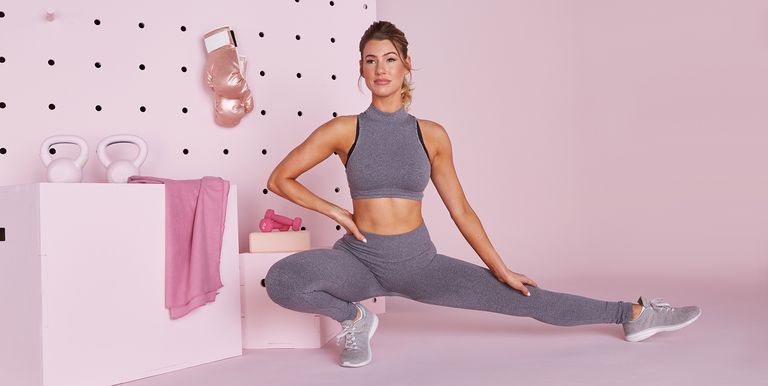Master These Strength-Building Moves To Make Your Next Rock-Climbing Workout Way Easier
Rock climbing basically screams mental and physical challenges. Not only do you need strong muscles from head to toe (your upper body gets a workout, as well as your core and legs), but it also requires a confidence and fearlessness to make it to the top.
Of course, you don’t have to pull an Alex Honnold and ascend sans ropes to gain the mind and body benefits of reaching a peak. Simply scrambling up an indoor rock wall will give you a massive sense of accomplishment.
“I always describe rock climbing as an ‘exercise in disguise,’” says Emily Varisco, ACE-certified personal trainer, head coach at The Cliffs Climbing and Fitness in New York City. “It truly is a full-body workout, but it’s also a lot of fun.”
And when she says full body workout, she means it—rock climbing works your forearms, biceps, triceps, deltoids, lats, traps, legs, and even your fingers. (Dang.) “Rock climbing is an especially great way to quickly build upper-body and core strength,” Varisco says. “And women tend to pick up the technical skills a bit more quickly because their center of gravity is lower and that can make for a pretty decent advantage in the sport.”



Whether you’re new to climbing, or want to up your game, Varisco curated a list of the best exercises to strengthen your arms, legs, back, and abs. Try ‘em out as a complement to climbing, and see how quickly you can scale that next obstacle that gets in your way to the top.
Do each of the moves below either after climbing or on off-the-rock days. “We do a lot of pulling in rock climbing, so when we cross-train, it’s important to work the opposite motions and antagonist muscles,” says Varisco. These moves will work the areas you need to climb higher, plus the opposing ones to keep you balanced as you go—all of which will help you reach peak performance.
1. Military Press
Important for… balancing out the pulls of climbing with presses overhead.
How to: Start standing, feet hip-width apart and knees not locked out. Bend your elbows 90 degrees, palms facing forward. Extend arms, pushing straight overhead until biceps are by ears. Slowly lower back down and repeat. Make sure your core is engaged and spine neutral. That’s one rep. Complete 8 to 12 reps.
2. Negative Pullup
Important for… strengthening the back of your upper body, which you need to lift yourself up.
How to: Set a bench or step under a pullup bar so you can reach it while standing. Grab the bar with both hands so that your chin is above it and elbows are out to your sides, pointed down toward the ground. Bend your knees slightly to hang, while keeping your pelvis tucked and core braced. Then, slowly lower down until your arms are straight. Keep your shoulders, lats, and abs engaged. Extend your legs to stand back on the bench or step and repeat. That’s one rep. Complete eight.
3. Dumbbell Chest Press
Important for… working the pecs—AKA the antagonist muscles of the upper body used for climbing.
How to: Lie down on your back with a 5 to 10-pound dumbbell in each hand. Straighten your arms and hold them over your chest. Make sure your wrists are in line with shoulders and palms face away from you. Bend your elbows to a 90-degree angle, resting your triceps on the floor. That’s your starting position. Press up to extend both arms straight over your chest. Then, slowly lower the weights back down to start. That’s one rep. Complete 10 to 12.
4. Dumbbell Front Raise To Lateral Raise
Important for… building shoulder strength.
How to: Start standing with feet hip-width apart and arms resting on your quads with a 5 to 10-pound dumbbell in each hand. Lift the weights up in front of you to shoulder height, palms facing down and elbows straight (but not locked out). Slowly lower back down resisting the urge to drop your arms. Next, lift the dumbbells out to your sides until your arms are parallel to the floor, palms facing down and elbows straight. Lower them back down to your sides. That’s one rep. Continue alternating slowing between both exercises without letting your shoulders creep up by your ears as you move. Keep your core tight and back straight, too.Complete 12 to 15.
5. Goblet Squat
Important for… glute and core strength.
How to: Start standing with feet hip-width apart, holding one kettlebell or dumbbell with both hands at your chest. Lower in to a squat by sending your hips down and back while keeping your chest up. Press through the heels and squeeze the glutes to stand back up. That’s one rep. Complete 12 to 15.
Want another full-body workout? Try this quick routine:
6. Wide Grip Lateral Pull-Down
Important for… strengthening the lats, a main muscle used in climbing.
How to: Use a cable machine with a long bar attachment for this exercise. Sit down at the machine and grip the bar overhead with your hands wider than shoulder-width apart, palms facing away from you. Lean back about 30 degrees and maintain a tall posture. Draw the shoulders and upper arms down and back to pull the bar to your chest. Straighten the arms back out. That’s one rep. Complete 12 to 15.
7. Leg lower
Important for… learning to use your core to drive your legs up.
How to: Lie on your back with your hands by your side and feet extended straight up in the air at hip height. Slowly lower your legs as far down as you can without your lower back lifting off the ground. Return to start. That’s one rep. Complete as many reps as possible in 50 seconds, then rest for 10 seconds.
8. Lying Dumbbell Tricep Extension
Important for… strength in the back of the arms.
How to: Lie down on a flat bench on your back, with a dumbbell in each hand, held over your chest, arms extended but not locked out. Make sure wrists are in line with shoulders and palms face each other. Keep your shoulders stationary as you bend the elbows to 90 degrees and bring the weights toward your face, in line with your ears. Your elbows should stay in line with your shoulders the entire time. Reverse the movement by straightening your arms back out. That’s one rep. Complete 15.
9. Kettlebell Swing
Important for… explosive power, plus strength in the quads, glutes, and core.
How to: Start standing with feet a little more than hip-width apart and a kettlebell in front of you on the ground. Bend over and grab the weight with both hands while engaging your lats and keeping your back flat. Lift the kettlebell and swing it between your legs, maintaining a neutral spine and just a slight bend in the knees. Then, drive your hips forward and press through your feet as you raise the kettlebell to chest height with straight arms. Use your hips and glutes to drive the movement, squeezing your butt and tucking your pelvis at the top. Let the kettlebell guide you back down in to a deadlift-like position (flat back, hinged hips) until it’s between your legs again. That’s one rep. Complete 12 to 15.
10. Plank Pulls
Important for… core stabilization.
How to: Attach a resistance band to a stationary object like a pole or heavy weight and hold the other end with your right hand or place it around your wrist. Then, get in to a high-plank position, shoulders right over the wrists and forming a straight line from shoulders to heels. Lift your right arm, palm facing down. This is your starting position. Pull the band with your right arm, aiming to bring your elbow in line with your waist. Keep your spine straight and hips square to the ground. Straighten your arm back out. That’s one rep. Complete 10 to 12 on each side.
11. Superman
Important for… strengthening your low back and posterior chain—a muscle group crucial to climbing, especially at steeper angles.
How to: Lie on your stomach, and extend your arms in front of you and legs behind you. Keep your palms facing down. Lift your legs and arms at the same time, hold, and release. Complete for 50 seconds, then rest for 10 seconds.
Reported by Kristine Thomason.
Source: Read Full Article
